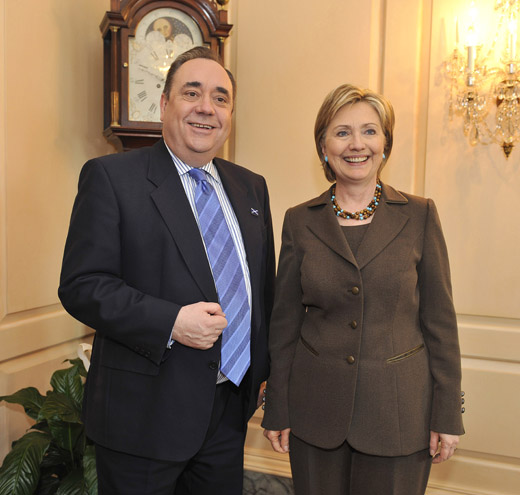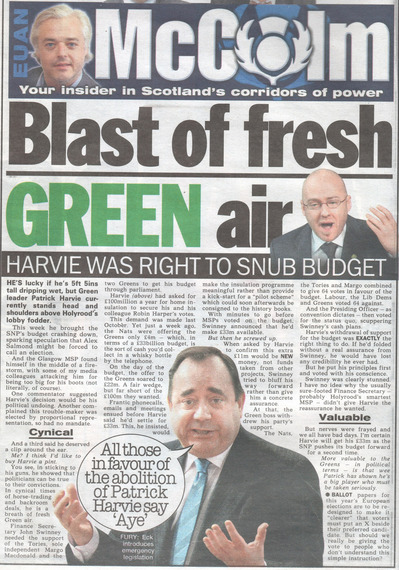
The passage of the Budget at the second time of asking has some odd consequences, I reckon. The dominant narrative says that the SNP turned chaos into triumph, the Tories came off best, and we lost our insulation programme (
which was never offered).
Leaving aside the latter, which I've already covered, here's a few thoughts on what was lost elsewhere. Whatever each party is taking credit for, there are definitely prices to be paid all round.
SNP: The Nats' costs are longer term, and so perhaps not immediately obvious. First, though, their entire aim is to demonstrate competence in government as a devolved administration as the first phase of building confidence in independence. Whatever the result the second time round, the first time was a Ministerial fiasco, and will have seriously undermined this perception.
Second, they decided to take out their frustration on the only party which
voted for Salmond to be given a shot at the top job in May 2007, we Greens. We're also, coincidentally, the only other party to have any kind of common ground with them on the single policy they're really committed to: independence. Rather than working in good faith with us, they turned to the "Unionisht Conshpirashy" to help them out. No discernable tactical genius here.
Finally, they missed a golden opportunity to be the first government anywhere above the local authority level to deliver a free insulation scheme. It's proved an incredibly popular initiative wherever it's been tried on a smaller scale, and it could so easily have been one in the eye for Gordon Brown and his discredited approach of endless failed targeting and bureaucratic hurdles. Instead, the Nats have just put a bit more money into that exact same approach.
Tories: Fair play, they got some money to help those town centres blighted by years of out-of-town developments, a problem which really took off in the Tory years. Perhaps next year they will propose something to help former mining communities. However, they have the most to lose as the supposed flag-bearers for the Union, and not just because Dave sounds absurd up here when he claims he's "
vigorously opposing" the SNP.
They prop up the SNP for a single reason only: the short-term tactical advantage they reap at Westminster because Gordon Brown's writ doesn't run in his homeland. Their coalition-in-all-but-name with the Nats can only help Salmond build the appearance he craves of competence and of national readiness for independence. Historians may well look back on the oddity of independence being prepared for by a Unionist-supported nationalist administration.
Labour: Labour went into this Budget process with one aim, to avoid replicating the shambles of last year. They managed to stay out of the spotlight, so that's a small job well done. However, in doing so, they voted for the SNP's Budget, putting themselves in an awkward position as the main opposition party. If the economy fails to pick up between now and March 2010, they can't blame the SNP for mis-allocating funding, whereas the SNP can continue to blame Labour in London for misusing its remaining macro-economic instruments.
The wider risk here for Labour is of total impotence, a year spent either backing the Nats or having the finger poked at them for the short-lived nature of their consensus politics. As budgets are squeezed and Labour complain, their dominant narrative in Glenrothes, we can expect to hear Salmond shouting at Iain Gray - "but this was a Budget he supported!"
Liberals: Credibility, credibility, credibility. As the most strident opponents of the Budget in advance, not just for its failure to include Tavish's unfunded tax cuts, their position has been the most inconsistent and absurd. They asked for nothing, to Salmond's glee, and he gave it to them in abundance. Is there a single person outside the Liberal parliamentary group who thought, up to the 28th of January, that the top priority was tax cuts, and who also thought, the very next day, that the top priority was a letter to the Calman Commission?
Possibly there are households where they speak of little else, but I would be surprised. Next time they try to negotiate on something, anything, Ministers know they can just wait ten minutes for a better offer. Tavish's two performances on Newsnight over this issue were new and extraordinary lows.
The public: They lost chance to get their homes insulated for nothing, cutting their bills, allowing them to spend more on themselves and in local economies across Scotland. Unlike the parties' problems above, though, this wasn't their fault.
 John Farquhar Munro has put himself centre stage on the referendum question, coming out in favour of one just as his leader confirmed, for now, his opposition. I'm still betting they'll u-turn before 2011, but it's fascinating to see at least one of the passengers in the back urging the driver to make the change now rather than blunder on in the wrong direction.
John Farquhar Munro has put himself centre stage on the referendum question, coming out in favour of one just as his leader confirmed, for now, his opposition. I'm still betting they'll u-turn before 2011, but it's fascinating to see at least one of the passengers in the back urging the driver to make the change now rather than blunder on in the wrong direction.














